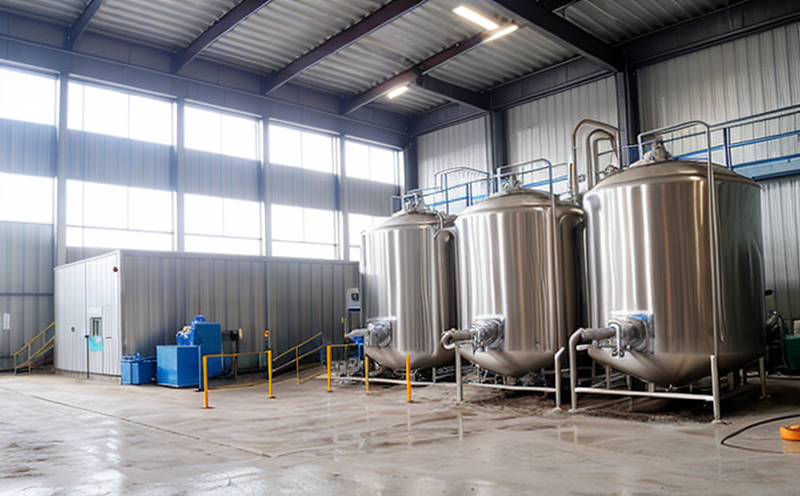ASTM D7065 Polycyclic Aromatic Hydrocarbons PAH Test in Industrial Water
The ASTM D7065 test method is a critical procedure used to analyze polycyclic aromatic hydrocarbons (PAHs) in industrial water. PAHs are a group of compounds that have been extensively studied for their potential carcinogenic, mutagenic, and toxic effects on human health and the environment. Industrial processes often involve the use of various chemicals and materials which can inadvertently release PAHs into water systems.
The ASTM D7065 test method is widely recognized in industries such as petrochemicals, refineries, and manufacturing where water quality plays a pivotal role in maintaining compliance with environmental regulations. The primary goal of this test is to ensure that the industrial water does not contain harmful levels of PAHs which could pose risks during processing or downstream use.
The testing process involves collecting water samples from various points within the industrial facility and then preparing these samples for analysis using specific techniques outlined in ASTM D7065. This includes extraction methods, derivatization, and chromatographic separation to identify and quantify PAHs present in the sample matrix.
Once the samples are prepared, they undergo sophisticated analytical procedures typically involving gas or liquid chromatography coupled with mass spectrometry (GC-MS or LC-MS). These instruments provide high sensitivity and selectivity necessary for detecting even trace amounts of PAHs. The results obtained from these analyses help in making informed decisions regarding water quality management.
The accuracy and precision of the ASTM D7065 test are paramount to ensure reliable data interpretation. Compliance officers, quality managers, R&D engineers, and procurement teams rely on accurate testing results to maintain operational efficiency while adhering to stringent environmental standards.
PAHs can originate from various sources including incomplete combustion processes, atmospheric deposition, or accidental spills during production activities. By regularly monitoring industrial water for PAH contamination using ASTM D7065, facilities can proactively address any issues before they escalate into more severe problems affecting both human health and the environment.
In summary, the ASTM D7065 test method is essential for ensuring safe and compliant industrial water practices by identifying potential risks associated with PAHs. Its implementation supports sustainable operations that contribute positively towards environmental protection goals set forth by regulatory bodies worldwide.
- Atmospheric Deposition
- Incomplete Combustion Processes
- Accidental Spills During Production Activities
Why It Matters
The importance of testing industrial water for polycyclic aromatic hydrocarbons (PAHs) cannot be overstated. PAHs are known carcinogens and mutagens that can cause significant harm if present in high concentrations in drinking water or process waters used within industries. Given their persistence in the environment, they pose a continuous threat even after initial contamination events.
Industries such as petrochemicals, refineries, and manufacturing rely heavily on clean water supplies for various operations ranging from cooling towers to boiler feed systems. Contamination by PAHs can lead to operational disruptions due to fouling of equipment or alteration of product quality specifications. Therefore, regular monitoring through ASTM D7065 testing ensures that these critical resources remain uncontaminated.
From an environmental perspective, improper disposal practices for waste streams containing PAHs could result in widespread pollution affecting aquatic ecosystems and wildlife habitats. By adhering to rigorous testing protocols like ASTM D7065, companies demonstrate their commitment to sustainable development principles and help mitigate broader ecological impacts.
In addition to safeguarding human health and preserving natural resources, compliance with relevant standards enhances a company’s reputation among stakeholders including customers, investors, and regulatory authorities. Demonstrating adherence to best practices in water management also fosters trust within communities surrounding industrial facilities.
Benefits
The ASTM D7065 PAH test offers numerous benefits that extend beyond mere compliance with regulations. One significant advantage is the early detection of potential contamination issues, allowing for timely corrective actions to be taken before they escalate into larger problems. This proactive approach helps minimize operational disruptions and reduces costs associated with addressing more severe contamination incidents later.
Another benefit lies in enhancing overall water quality management within industrial settings. By regularly testing for PAHs using ASTM D7065, facilities can identify areas where improvements are needed to maintain optimal water conditions throughout the production cycle. This leads to improved efficiency and productivity across multiple departments responsible for maintaining water systems.
Moreover, compliance with international standards like ASTM D7065 instills confidence among stakeholders including customers, suppliers, and regulatory bodies. It demonstrates a company’s commitment to environmental responsibility and sustainable practices. Such reputational benefits can translate into enhanced brand value and competitive advantage in the market.
In summary, the ASTM D7065 PAH test provides tangible advantages related to operational efficiency, environmental stewardship, stakeholder relations, and long-term sustainability initiatives. These factors make it an indispensable tool for maintaining high standards of water quality within industrial environments.
International Acceptance and Recognition
The ASTM D7065 test has gained significant acceptance and recognition internationally, particularly among industries engaged in petrochemicals, refineries, manufacturing, and wastewater treatment. Many regulatory bodies worldwide have adopted this standard as a benchmark for evaluating PAH levels in industrial water.
- Australia - National Environmental Standard for Water Quality
- Canada - Environment Canada Guidelines for Canadian Drinking Water Quality
- European Union - Directive 2008/105/EC on the quality of surface and groundwaters intended for human consumption
- New Zealand - New Zealand Drinking Water Standards Part II
- United States - EPA Method 610.4 (part of the National Contaminant Occurrence Database)
The widespread adoption of ASTM D7065 reflects its reliability and robustness in providing accurate measurements of PAH concentrations, which are crucial for maintaining safe and compliant industrial water practices.





